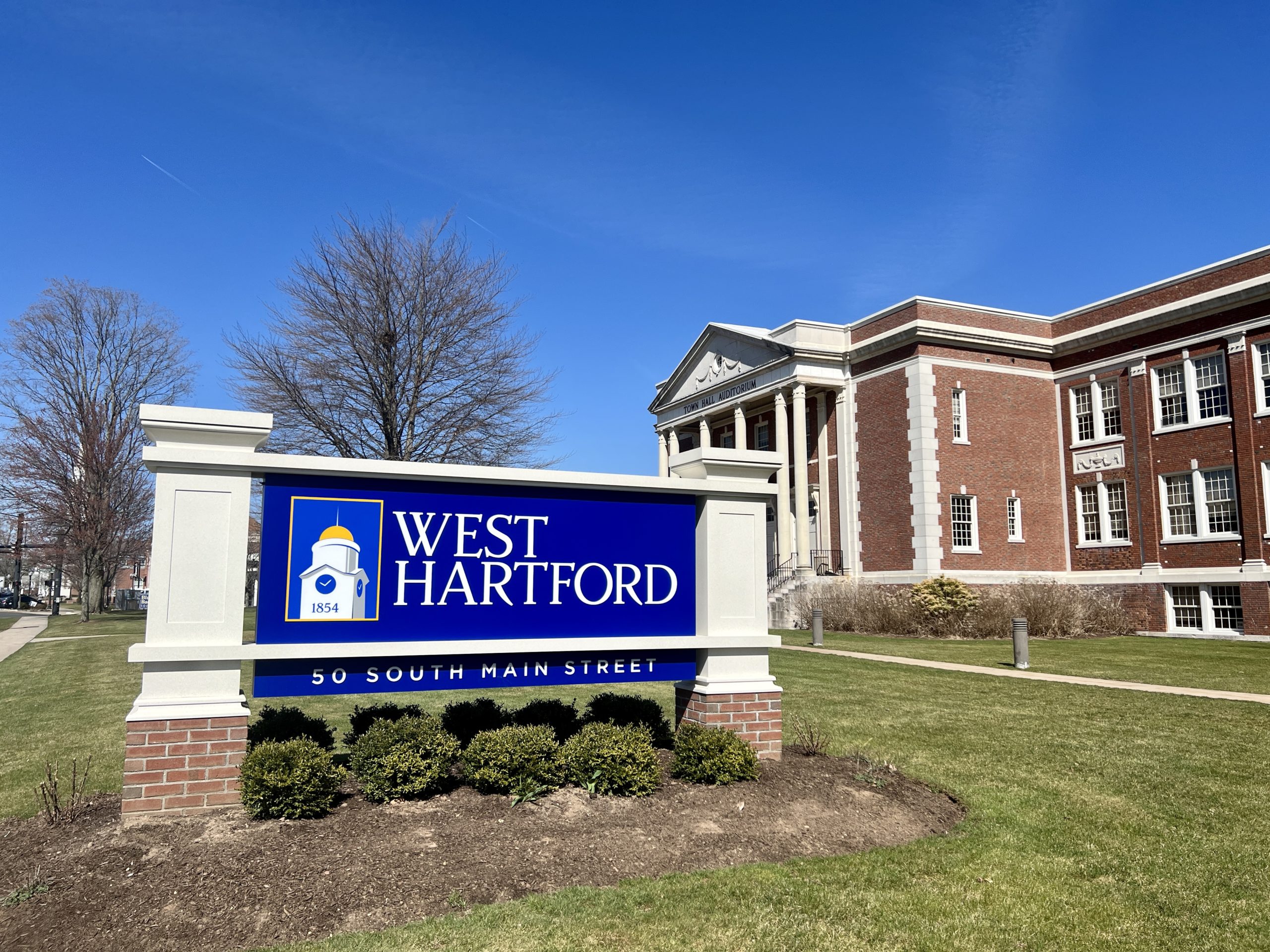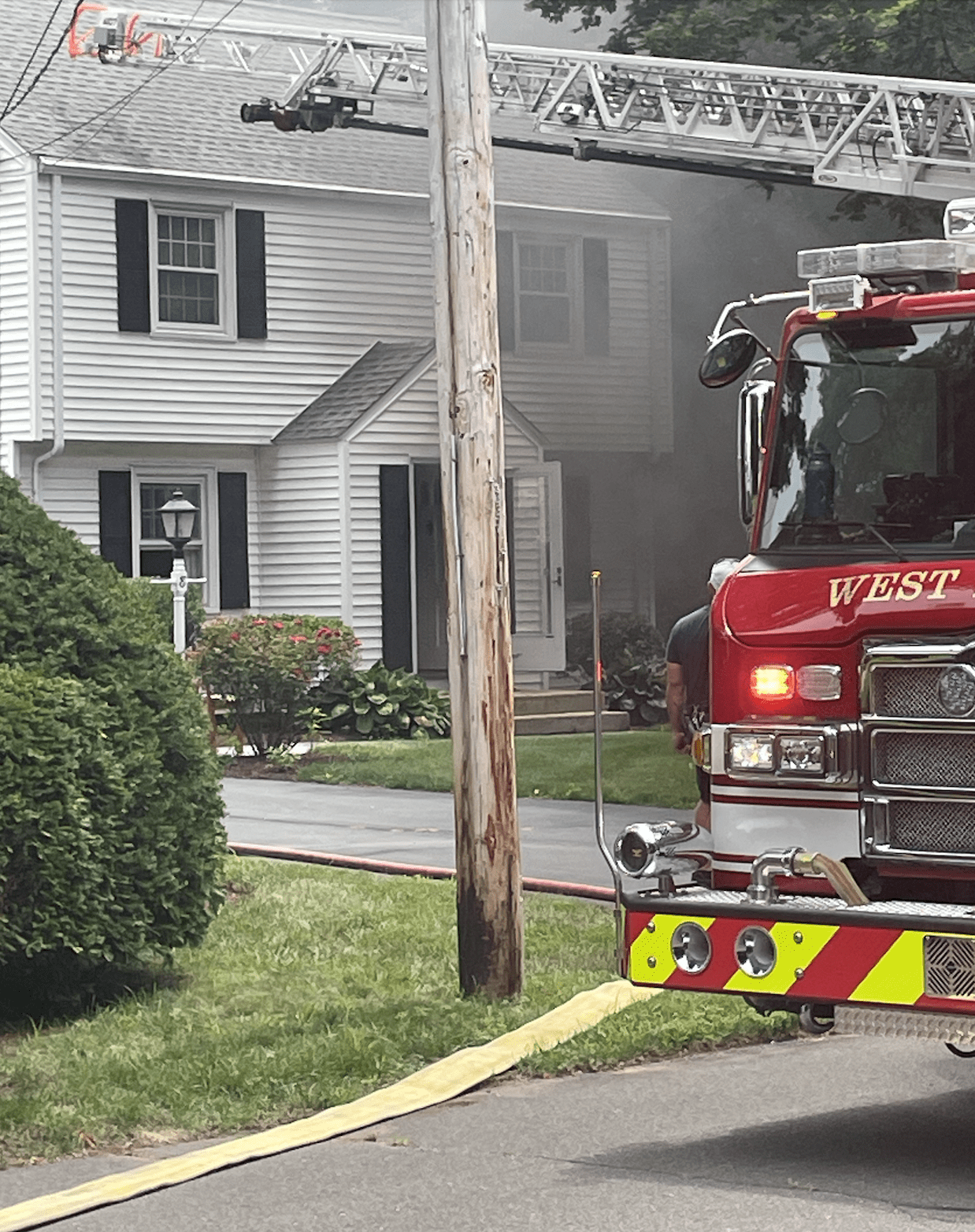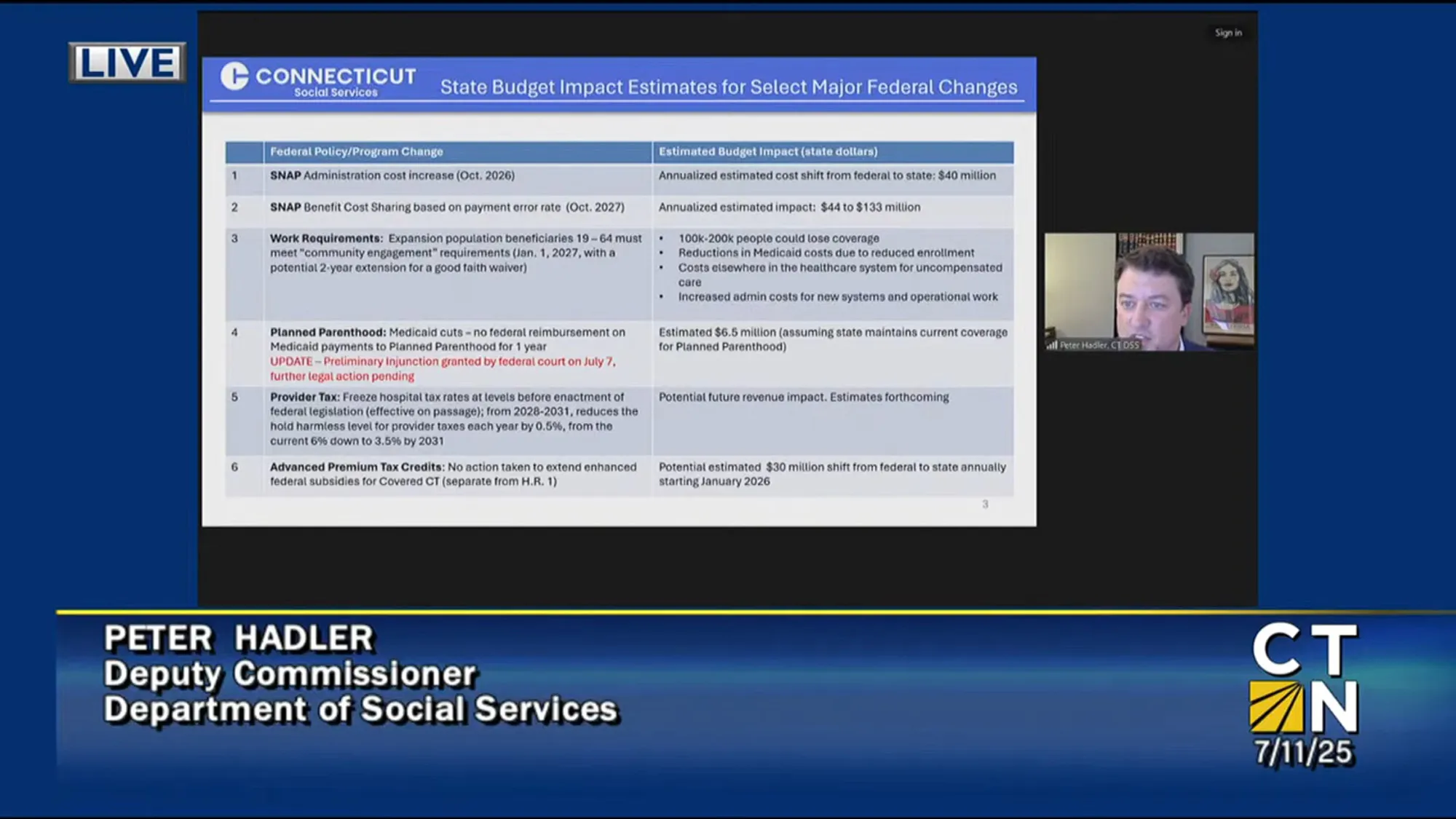West Hartford Town Council Adopts Budget with 1.86% Tax Increase

Audio By Carbonatix

West Hartford Town Hall. Photo credit: Ronni Newton
The West Hartford Town Council voted 7-2 to adopt the FY24 budget after making a few amendments to the town manager’s original proposal.
By Ronni Newton
The West Hartford Town Council voted 7-2 Tuesday night to amend and then approve a $331,190,664 general fund budget for the 2023-2024 fiscal year, and voted 8-1 to approve an amended mill rate of 40.92 mills for the upcoming fiscal year.
Property taxes will increase by 1.86% to meet the spending plan, which increases by $14,108,513, or 4.45% from FY23.
Also incorporated into the FY24 budget is the remaining 25% of the most recent revaluation. When adopting the FY23 budget last April, the Council voted to lessen the burden of revaluation by phasing it in over two years.
Before the Town Council voted Tuesday night, Town Manager Rick Ledwith explained several changes that had been made to the spending plan he initially proposed on March 8. “Since that meeting this Council has met seven times to deliberate this budget,” he said.
Resulting changes from the original proposal include a $500,000 increase in investment earnings on the revenue side due to higher interest rates that are expected to persist through the end of 2023. In addition, the Board of Assessment Appeals has completed its work and the result is a decrease in the reserve level of more than $240,000.
The net revenue increase is $940,029.
On the expense side, there were four positions – two police officers, a fire inspector, and a librarian – which Ledwith had originally proposed using American Rescue Plan Act (ARPA) to fund on a phase-in basis for the upcoming fiscal year. The Town Council requested that those positions – at a total expense of $432,879 – instead immediately be made part of the general fund budget. The additional police officers and fire inspector are critical positions as the town anticipates adding more than 1,000 new multifamily residences in the near future, and the librarian is needed as library utilization is returning to pre-COVID levels.
Expenses will also be increased with an additional donation of $7,150 to Interval House, a local nonprofit organization which provides services to individuals who are victims of domestic violence.
When the Board of Education adopted its budget on April 4, they added $183,559 to support maintaining a second STEM position at Smith STEM School and to continue a subsidy for pay-to-play fees at the high schools. While the Town Council can’t make line item changes to the school budget, they can determine the overall allocation and voted to instead add $250,000.
Ledwith said the state delivered some bad news last week, advising all school districts that the excess cost grant for special education, which had been budgeted at 85% reimbursement, will only be funded at 73.7%. The impact will be a shortfall of roughly $700,000 in the current fiscal year – which the district will have to make up – and an expected shortfall for FY24 as well, which the extra funds allocated by the Town Council will help address.
The Board of Education budget, which is 57% of the town’s overall general fund budget, is now $190,191,121 for FY24, an increase of 4.97% from the FY23 budget. Town services will increase 4.74% for FY24, and capital financing expenses have decreased by 3.24%.
The mill rate adopted by the Town Council Tuesday for FY24 of 40.92 mills is 0.24 mills more than the current rate of 40.68 mills but slightly lower than the original proposal of 40.96 mills.
Before voting on a series of amendments to the budget and resolutions for appropriations and the tax levy, each Council member thanked Ledwith and town staff for their work.
Republicans Al Cortes and Mark Zydanowicz cast the two votes against the budget itself, although once it had passed they both voted in favor of the tax levy. Minority Leader Mary Fay voted in favor of increasing the Board of Education budget and the overall general fund budget appropriation, but cast the lone vote against the tax levy and also voted against an appropriation to the Capital Improvement Fund.
A resolution appropriating $2,350,000 of ARPA funds ($2,200,000 for the West Hartford Center Infrastructure Master Plan and $150,000 for the Vision Zero Task Force) passed unanimously.
“This is the most important thing that we do each year,” said Deputy Mayor Liam Sweeney, who chairs the Council’s Finance and Administration Committee.
He said this budget invests in the town’s schools, and as the recovery from COVID-19 continues, he said the schools are a major investment in making West Hartford one of the most desired places to live.
“I think that the other thing this budget does is has money allowing us to protect our community,” Sweeney said, adding police officers to not only help implement Vision Zero but also to be prepared for growth due to development. The additional fire inspector will also be needed as the town continues to grow, he said. The budget supports “the three pillars of investing, protecting, and letting it grow,” keeping the town ahead of the curve.
“Budgets are always hard … but I still struggle with the impact to the taxpayers,” Fay said. “We knew coming in here they were already going to face an increase because of the revaluation,” so without doing anything taxpayers would be hit with increase because of phase in last year, and on top modest one from this new budget.
Fay said she is “worried about the headwinds” and an upcoming recession, and while avoiding any tax increase would be difficult, “We’re getting to a tipping point,” she said, noting that she has gotten complaints about taxes from seniors, and there need to be changes to the budget going forward.
“There is just so much that makes West Hartford such a great community,” said Deb Polun, who chairs the Council’s Human and Community Services Committee.
She praised the investments that have been over the past year in areas that fall within that committee’s purview – including improvements to parks such as new pickleball courts, a gaga pit, and bleachers at Cornerstone, an assistant director of Social Services, expansion of the Food Pantry operations, and initial planning for the new Elmwood Community Center. “Moving into next year we’re going to keep up with all of that and have exciting new projects,” she said.
Polun said Leisure Services has traditionally struggled to remain in the black but expects to this year, and there are plans for updates to the Rockledge driving range. It won’t have much fiscal impact, but she also noted that the library will be “fine free” beginning in the next fiscal year, which is a recommendation by the American Library Association to help erase barriers to library use.
Cortes said budget season is his least favorite time of the year, and in particular adding the rest of revaluation doesn’t make it any easier than it was last year. “You want to move forward a budget that doesn’t hurt residents,” he said, but the question is always what do you want to cut.
“When I ran for Town Council one thing I ran on was right-size government,” Cortes said, but that’s not necessarily cuts but might mean adding more staff to help with permitting but cutting at higher levels.
While affordable housing is being addressed and is something Cortes said he personally feels is important, “the middle class, how do we make West Hartford more affordable for them? … It’s hard to ask that paycheck-to-paycheck person, just give me a little bit more.”
“Budget season is always a challenge I think for all of us,” said Carol Blanks, adding that she associates it with “March Madness.” West Hartford’s continued recognition by Money Magazine, Niche, and other organizations is a source of pride, she said, and the town continues to be a magnet.
“This budget I feel is reasonable,” said Blanks, and provides resources to continue to reflect the town’s diversity and ensure the town remains inviting as it continues to grow. She chairs the Council’s Public Safety Committee and specifically noted that the budget supports personnel contracts, and critical additional positions in police and fire staff as well as equipment.
“Our police officers and firefighters rise to the occasion,” Blanks said, and over the past year have responded to more than 9,000 emergency incidents, conducted multiple training exercises, and have been recruiting from a diverse pool to reach full staffing.
“You did yeoman’s work,” Zydanowicz told Ledwith, noting that the budget is something that all take very seriously.
“There are a lot of things we like about this budget … as a fiscal conservative sometimes it’s about cuts.” He said he asked Ledwith what a 1.5% cut would mean, and it would mean eliminating 20.5 teachers. “We’re a people organization,” Zydanowicz said, and while he thought a 1% cut might be reasonable and may be something to consider going forward, it would still mean profound cuts of teaching positions, or firefighters or police.
“We couldn’t get there, and I didn’t want to see any teachers get cut,” he said, or firefighters or police. “I couldn’t fathom that.” Safety is one of precious things we have, he added.
“At some point we need to meet that road … and offer a sustainable budget going forward so it’s not necessarily always an increase, always an increase, always an increase,” Zydanowicz said.
Ben Wenograd chairs the Council’s Public Works, Facilities, and Sustainability Committee. He said that the Public Works Department completed about 9,700 work orders last year, an increase of 14%. They are implementing a food scrap recycling program, and support outdoor dining and a host of other activities.
Driving this year’s Public Works budget is fully funding positions and adding a street and grounds maintainer – which is critical to preserving the town’s investment in its roads and fields.
“I am not a fiscal conservative but I am frugal,” said Wenograd, noting that while we are adding positions, we are not rubber stamping but rather asking why things are needed. “There are no freebies,” he said.
The one thing we can’t do is just pick a number to cut, Wenograd said. “Our job is to set policy and there is no way to do that other than to craft a reasonable budget,” and many of the costs are fixed. From our point of view we can’t cut anything without taking responsibility for what the cuts would be to those programs, he said.
Tiffani McGinnis was named to the Town Council on the night of the budget presentation, and said she has appreciated the process of reviewing it through the committee structure.
She listed accomplishments over the past year, including the North Main Street road diet, establishing the Transit-Oriented Development District, rehab work for Park Road, and new tennis courts and Conard and Hall. ARPA funds have helped with recovery and are being used to support affordable housing and wayfindinig signage. Future goals include a public roadway safety study, completing the Trout Brook Trail, and the employment of a new building inspector starting in early May.
“These accomplishments, along with many others, are why people want to locate here to live and grow,” said McGinnis.“I’m proud of this budget and truly excited for the future of West Hartford.”
“This is the most important thing that we do in this town and that we oversee,” Mayor Shari Cantor said of the budget, and she also gave a shout out to all of the committee chairs, and thanked West Hartford Community Interactive Executive Director Jen Evans for the work she does to keep the community engaged and informed.
“We have incredible town management,” Cantor said, “and again this doesn’t just happen, we invest in the town management.” This is Ledwith’s second budget as town manager, and department leaders definitely didn’t get everything they wanted when they brought their budgets to Ledwith.
“There is so much work before it gets to us,” Cantor said, thanking all of the directors, including newly-named Superintendent of Schools Paul Vicinus, who was in the audience, as well as the finance staff.
“The budget is a reflection of our values and priorities,” said Cantor, but like everyone’s personal finances is being impacted by inflation. “We try to do a budget that meets the needs of the community, meets our obligations, our commitments, but also invests in the tomorrow that we want to keep doing.”
The town could not have managed the pandemic if there had not been an investment in public safety, or in buildings. If the town had taken shortcuts and not funded certain things, we would not have been able to respond, recover, or have resiliency. “We are building momentum in our community. … We know it and we understand that we can’t respond, we can’t do our jobs without the right resources, the right tools,” Cantor said.
“If you stand still you lose the race,” she said. The town is recognized with accolades and a destination ,“and we are very proud of our vibrant, welcoming community.” It’s not just luck, she said, it’s taking measures to succeed and investing in the community. The decisions made impact home values, momentum, and there is record investment in the community. and transformational projects underway that have been goals for years.
The housing shortage, which impacts not only the town but also the state and the country, also impacts a workforce shortage and the need to have opportunity for people who work in town to live in town. “Having a variety of affordability is important. … That is a really important part of our ecosystem.”
The way Connecticut is structured, property taxes pay for 89% of the budget, and development is needed to contuse to grow the grand list, to be able to invest in public safety, road safety, sustainability, and for initiatives like creation of the new Elmwood Community Center and teen center that will be a model facility.
“There are challenges ahead. We know some of them, we don’t know some of them, but with this budget we’ll be able to respond,” said Cantor. The current pace of economic development will make us stronger for 20 to 30 years and allow for continued investment in town infrastructure.”
Prior to the end of the fiscal year, the Board of Education will need to determine how to allocate the additional funds the Town Council approved Tuesday night.
Like what you see here? Click here to subscribe to We-Ha’s newsletter so you’ll always be in the know about what’s happening in West Hartford! Click the blue button below to become a supporter of We-Ha.com and our efforts to continue producing quality journalism.




Any money to pave roads?